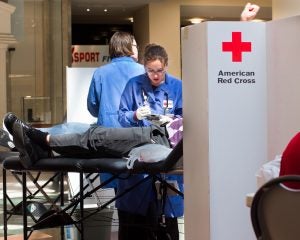Hopefully everyone is reading this article from the comfort of their home unless they absolutely have to be out in the community right now. I was planning on writing an article about the Dirty Dozen this month, but it seems weird to write about something that has nothing to do with the current pandemic. So, instead I’d like to give you a list of things you can do to help out your community in this time of need, as well as provide a list of services for those who are in need.
Here in Minnesota, an executive order was recently issued for all restaurants to close their in-dining options. Only delivery, drive-thru restaurants, and take-out will be allowed through March 27. Schools, gyms, and malls are now closed, as are places of worship. They are now telling everyone to cancel or postpone any gatherings with 50 or more people for the next eight weeks. I know people in many other states and countries are in the same situation. Hopefully this will allow more people to stay home to help flatten the curve. This is obviously taking a huge toll on those whose livelihoods depend on these closed businesses as well as on children who are no longer able to receive free or reduced lunches at school.
So, what can we do to help while doing our part by staying home too? I’d like to emphasize the stay at home part of this. If you do have to go out, make sure to abide by the Centers for Disease Control and Prevention advice to wash your hands frequently, maintain at least 6 feet of distance between yourself and others and avoid touching your eyes, nose, and mouth.
Here are some ideas for people who would like to help out their communities without leaving their homes:
- Donate to Feeding America, a national hunger-relief organization. They accept donations in order to help give food to those who need it most, including children who usually get meals at school.
- Donate to a local food bank — you can use this directory to look for local food banks and soup kitchens in your area.
- Donate to organizations like Meals on Wheels, which helps deliver food to seniors who may be self-isolating in order to stay healthy.
- Baby2Baby, a nonprofit that gives basic necessities to children living in poverty, is also in need of donations. You can even purchase supplies for Baby2Baby to distribute on its Amazon page.
- Purchase a gift card to a local restaurant, coffee shop, or salon to use at a later date.
- Donate to local restaurants that are providing free meals to those in need.
- If you cancel an appointment with someone who relies on in-person services (a house cleaner, a nanny, etc.) and you’ve already budgeted the money, pay them anyway.
- Buy goods online from local stores.
- If you get food delivered or pick it up from a restaurant, tip well.
Here are some ideas for people who would like to help out their communities requiring some travel outside of the home (do not do this if you are not feeling well):
- Donate blood — The Red Cross currently has a severe blood shortage. Donors are urgently needed right now. Eligible and healthy donors are strongly urged to make an appointment to provide lifesaving blood products to patients. Find out if you’re eligible to give and how to do so here.
- If you are making a trip to the grocery store, ask your neighbors if they need anything, especially those that may be in a high-risk group. The less people going to the store, the better.
- Volunteer to deliver food to students for local public schools.
- Volunteer to deliver food for a local food pantry.
- Reach out to anyone in your life who might be at high risk, whether they are elderly or immunocompromised, to see if you can safely pick up food or medicine for them.

For those in need during this time:
- Check your school district’s website or Facebook page as many schools are offering “grab and go” style meals to students or other meal services.
- Contact your local food bank. Many food banks and pantries are also exploring ways to provide delivery services. Call the National Hunger Hotline to find services near you: 1-866-3-HUNGRY
- Many grocery stores are reserving the first hour of operation each day for those shoppers who are at a higher risk of severe illness by COVID-19, which includes older adults and those who have compromised immune systems. Check with your local grocery store to see if they are participating.
- Many local restaurants are providing free meals to those in need. Here is a list for those in Minnesota.
- Consider federal food assistance programs such as WIC or SNAP.
- Find additional resources for which you may be eligible. Most states offer a 2-1-1 hotline that can help connect you to a variety of services in your area.
- Reach out to local churches, communities and neighbors who are organizing relief for those in need.
- If you are employed in an industry that is impacted by required shutdowns, please check with your state governments to understand if you can qualify and apply for unemployment insurance (UI).
- If you are a business owner impacted by a required shutdown, please stay in touch with your state governments as they may have financial relief options available very soon to help buffer this impact.
Information regarding COVID-19 is constantly being updated. Stay up to date by visiting the CDC or WHO websites. Also, be sure not to hoard supplies so that those who are sick, and those who can’t afford to purchase anything extra, can still get what they need. Stay safe and stay home if you can!
Food Science Babe is the pseudonym of an agvocate and writer who focuses specifically on the science behind our food. She has a degree in chemical engineering and has worked in the food industry for more than decade, both in the conventional and in the natural/organic sectors.



